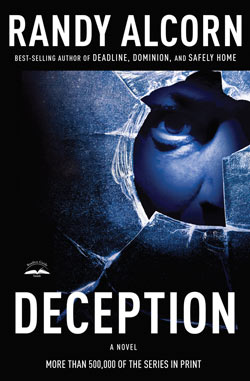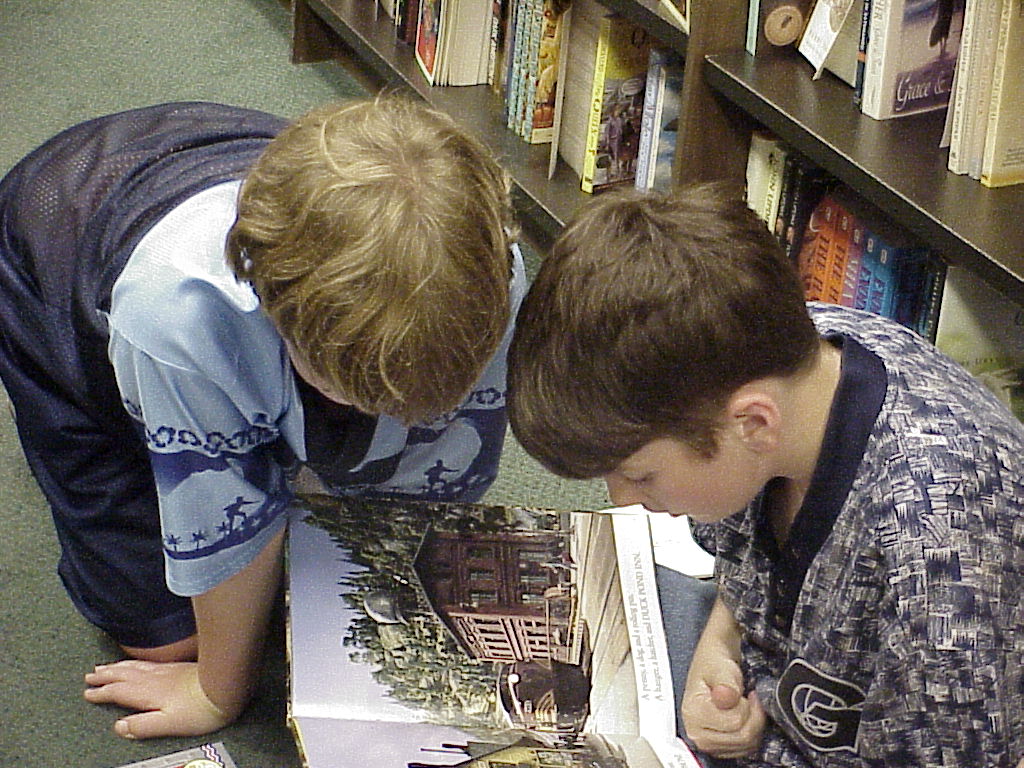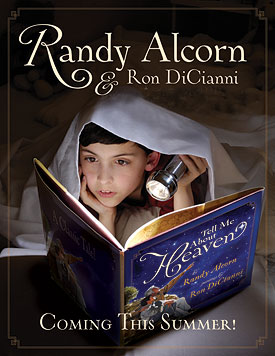 Tell us about your latest novel.
Tell us about your latest novel.
Deception is a murder mystery. It isn’t a strict sequel to my first two novels Deadline and Dominion, but a spin-off. It can be read before the others.
While writing other fiction and lots of nonfiction over the last decade, I’ve never lost sight of Deadline and Dominion. I’ve always hoped to go back and pick up where I left off. I’ve thought there needed to be a third book, a different story with a different viewpoint character.
Jake Woods was the main character in Deadline, with fellow-journalist Clarence Abernathy and homicide detective Ollie Chandler in support roles. Clarence, an African American, was the main character in Dominion, with Jake and Ollie supporting him. But in certain ways the most interesting character—and I do mean character—is Ollie Chandler, who can be funny and cynical and outrageous. Writing Deception fulfilled my desire to go back to Ollie and give him a shot at his own book, this time with Jake and Clarence in support roles.
Tell us about your journey to publication.
While many people think they want to write a book, what they really want is to have written a book. It’s sort of like wanting to be thin without exercising or eating right. It’s fun to hold in your hand a book you wrote, but good writing, like good farming and good bricklaying, takes real work.
Since I wrote my first book 25 years ago, I’ve written 26 more. Each one is different.
Deception has been on my mind, off and on the back burner, for ten years. It was fun—but a lot of hard work—to finally write it. The many letters I got from those who’d read Deadline and Dominion served as a big encouragement to write this semi-sequel. It’s really fun to have the end product now, and to feel good about it.
You write best-selling and award-winning fiction and non-fiction. Which do you enjoy the most and why?
I enjoy most whichever I’m currently writing. But after I’ve finished a novel, I’m always ready to do some nonfiction, then after two or three nonfiction books I’m eager to do a novel again.
 Not many writers go back and forth from fiction to non-fiction, and I’ve been told it muddies the waters in terms of how people perceive you as a writer. Honestly, I’m not really concerned about the waters and the perceptions. I ask God each time to direct me toward what He wants me to do next. I think He has, and I’m grateful to be able to write both fiction and nonfiction, and I hope to do both as long as He gives me strength.
Not many writers go back and forth from fiction to non-fiction, and I’ve been told it muddies the waters in terms of how people perceive you as a writer. Honestly, I’m not really concerned about the waters and the perceptions. I ask God each time to direct me toward what He wants me to do next. I think He has, and I’m grateful to be able to write both fiction and nonfiction, and I hope to do both as long as He gives me strength.
Fiction and nonfiction, of course, are very different. In nonfiction, you can directly say whatever you want to. You don’t have to be subtle; in fact too much subtlety makes it obscure. You can tell, you don’t have to just show.
But in fiction, the rule is “show, don’t tell.” Fiction allows the imagination to soar.
If only one of your books could survive the next century, which would you choose?
Of my novels, though in some ways I think Deception is the most fun and maybe the best written, I’d have to say Safely Home. The number of lives I’ve been told about that have changed through reading that novel amazes me.
Of my nonfiction, it’s a tough call, so I’ll cheat and say The Grace and Truth Paradox and Heaven. The Heaven book has been a real surprise, with 400,000 in print just two and a half years after it was released. We get an amazing number of letters from people who say they now look forward to Heaven and are excited about the New Earth, and that they’ve received great joy and comfort from the book. Churches and small groups everywhere are studying it, which blows me away.
 Okay, I’ll also mention The Treasure Principle, which has now sold close to one million copies, and which God has graciously used to transform the way countless people give. It’s another book that no one would have guessed would find eager readers. No publisher was saying a few years ago, “Hey, to sell a million copies we need somebody to write a book about the joy of becoming a radical giver.”
Okay, I’ll also mention The Treasure Principle, which has now sold close to one million copies, and which God has graciously used to transform the way countless people give. It’s another book that no one would have guessed would find eager readers. No publisher was saying a few years ago, “Hey, to sell a million copies we need somebody to write a book about the joy of becoming a radical giver.”
What do you say to the folks who think as Christians we shouldn’t be writing or reading fiction?
First, that writing fiction is not synonymous with telling lies!
There’s a great deal of untruth being passed off in the form of nonfiction. And some of the greatest truths are found in novels. When Jesus spoke in parables, he wasn’t lying or misleading, but telling stories with great spiritual impact.
As long as people know that fiction is fiction, we shouldn’t apologize for using our God-given imaginations to create worlds for characters to inhabit, and for readers to enjoy and learn from.
There are many non-believers and there are many nominal Christians who will read fiction who wouldn’t read spiritually oriented non-fiction. Readers become open to certain truths and realities in a fiction form that they’re not open to in a frontal, direct, non-fiction form. You hand your readers a story, and if it’s engaging, you’ve earned access to their minds, and you can influence their worldview through it. It’s a kind of “Trojan horse” effect. I mean, people open the gates of their minds and you come in, but they don’t notice everything you’re bringing with you.
My purpose as a writer is the same in fiction or nonfiction. I want to communicate in such a way as to challenge the thinking of readers and touch their hearts. I want to draw them into the story (fiction) or the subject matter (nonfiction) in a way that influences their perspective and worldview. I want to entertain, but also educate.
While telling an entertaining story, I hope to shift readers to a more biblical worldview, partly by showing the positive consequences of right thinking and choices, and the negative consequences of wrong thinking and choices.
Everything I write is intended to further an eternal perspective: “We look not at the things which are seen, but the things which are unseen; for the things that are seen are temporary, but the things that are unseen are eternal” (2 Cor. 4:18).
Do you think Christians have a moral obligation to present the gospel in the novels we write or can we relax and just pen a good yarn?
I’m all for a good yarn. But a good yarn doesn’t have to be just a good yarn.
I don’t think the gospel always has to be fully presented in our novels, and certainly it will emerge in a variety of ways in different stories, but I think each novelist needs to ask God for direction. I suspect that if we listen to God, and if our lives are sufficiently captivated by the good news of Jesus, then that good news will inevitably inhabit our writing and make itself evident to readers.
Christian novelists are often warned against writing fiction that’s thinly veiled propaganda. Of course, I’m opposed to propaganda. But I’m convinced it’s possible to artfully present a story that contains significant spiritual themes.
I try to earn the right to integrate eternal themes into my stories by writing them well. I hope I’ve done that in Deception. If a story is poorly written or comes across as a sermon, then obviously it won’t reach people. They’ll be aware that you’re using your novel as a means to an end, or forcing something on them. But in a good story, the spiritual component is so woven into it, so inseparable from it, that it has credibility and lasting impact.
I think the fear of being perceived as preachy and heavy-handed has become so heightened now that some Christian novelists have become gun-shy about including any spiritual content. Experience has shown them that even Christian reviewers are quick to call a story “preachy” if it has substantial spiritual content, even when it’s an integral part of the story and true-to-life.
The result is that “Christian fiction” is now for many people just “clean fiction,” defined by the absence of profanity, explicit sex, and gratuitous violence.
I think a Christian novel is better understood not by the absence of the unspiritual, but by the presence of the spiritual. Of course, that does not mean a novel is a lengthy gospel tract! But it does mean it offers more than the mere lack of offensiveness. In fact, a truly Christian novel may be spiritually offensive to some readers, both believers and unbelievers.
Walking with God, praying, church, and discussions about the Bible and spiritual longing are in fact a real part of life. So it’s not being “unreal” to integrate these things into a story. It just needs to be done thoughtfully and skillfully, making sure it comes from inside the story, not outside it. Fiction should be art, but art is certainly not devoid of spiritual meaning.
Every author—whether atheist, agnostic, Hindu, New Age, or Christian—has a worldview. And every author’s worldview is evident in a storyline, with varying degrees of explicitness. While not every writer is called to include the same degree of spiritual content, I find it ironic that some Christians are pulling back from letting their worldview emerge in the course of a storyline. The result may appease some critics. But it will leave many readers—who in real life long for meaning and eternal perspective—feeling mildly entertained but ultimately unchallenged and unchanged.
 Describe what you believe is the role of writing and reading in the Christian life.
Describe what you believe is the role of writing and reading in the Christian life.
God is an author. The universe itself is His book. Each person is a chapter. History really is His story. Christ is the Word, the very essence of God, and expression of God. We are created in God’s image, and made to be sub-creators, authors who create and weave together both non-fiction and marvelous stories on which our imaginations can soar. When we write and read such works, He is pleased.
As an author, I’m very aware that I’m a steward of words, and I labor to get them right.
Books and bookstores have had an enormous influence on my own life. My first youth pastor did me a huge favor—he gave me a key to his office, so I could go in any time and read his books, hundreds of them. I read everything I could get my hands on. There was an elderly couple in our church, named Bill and Martha Kuntz. They had a Christian bookstore in their house in Gresham, Oregon, my hometown. I would go there several days a week, for hours at a time. They would point out books for me to read. They introduced me to Lewis, Schaeffer, and Tozer, and books such as Tortured for Christ, God's Smuggler, Through Gates of Splendor, and The Cross and the Switchblade.
Over the years I’ve bought and read thousands of good books, many of which are now in our church library. I can’t divorce God’s works of grace in my life from good books. In my book Heaven, I talk about books the Bible says are now in Heaven, and I present reasons for believing that other books will be written and read on the New Earth.
What’s something you wish you’d known earlier that might have saved you some time/frustration in the publishing business?
The most valuable lesson I’ve learned about writing is that it’s hard work. Writing is both energizing and draining, something I love to do and sometimes hate to do. Sometimes it’s a joy. Sometimes it’s like the tenth hour of chopping wood: you just want to be done. It’s never done, but eventually it has to be turned in.
I’ve learned that what’s easy to read is hard to write, and what’s easy to write is hard to read. I’m a steward of words, and I’m accountable to God for how I arrange them. That’s the best reason for working hard at rewriting: “work at it with all your heart, as working for the Lord, not for men” (Colossians 3:23).
I’ve learned I need honest critics and careful editors. But above all I need Christ, who said, “Apart from Me, you can do nothing” (John 15:5). When I work this hard at something, I don’t want it to amount to nothing. I want it to last forever. I want to hear the Audience of One say, “Well done.” No payoff could be bigger than that!
What are a few of your favorite books? (Not written by you)
Nonfiction: The Knowledge of the Holy by A. W. Tozer, Mere Christianity by C. S. Lewis, Knowing God by J. I. Packer, Desiring God and The Pleasures Of God by John Piper, He Is There & He Is Not Silent by Francis Schaeffer.
Fiction: The Chronicles of Narnia by C. S. Lewis; The Lord of the Rings trilogy by J. R. R. Tolkien; C. S. Lewis’s Space trilogy, especially Perelandra; The Singer Trilogy (including The Song and The Finale) by Calvin Miller.
Those who read my new novel Deception will see that I have a special love for Conan Doyle’s Sherlock Holmes stories—every chapter begins with a Holmes quote. In Deception, I also pay tribute to the Nero Wolfe mysteries by Rex Stout. I’ve read or listened to most of the forty-seven Nero Wolfe books.
Do you have a pet peeve having to do with this biz?
I hate ghostwriting. That’s where the names of the actual writers of books aren’t put on the cover, and instead a celebrity name is put on it, even though the celebrity invested almost nothing in the book. This is done to sell more books, but I fail to see how it differs from lying. (I’m not talking about books where the celebrity’s name is accompanied by the name of the real author, but when the real author’s name isn’t included.)
If you set back the odometer on a car it will sell for more money, but it’s still dishonest. Years ago the secular world condemned Milli Vanilli for lip-synching, pretending someone else’s voices were their own. How can Christians and Christian agents and publishers tolerate misleading the public by pretending well-known pastors or public figures wrote books they didn’t write? How can they give interviews pretending to have actually written the books? How can they receive awards for books they didn’t write?
This problem is being dealt with as more authors and publishers are standing up against it. But it still happens, and when it does I think it brings disgrace to the name of Christ.
My single biggest concern is the way that successful authors tend to lose perspective and become demanding and prideful. This dishonors Christ, ruins character, and undermines ministries. Materialism and the celebrity culture have poisoned the church, and we have put ourselves under God’s judgment.
I Peter 5 says, “All of you, clothe yourselves with humility toward one another, because, ‘God opposes the proud but gives grace to the humble.’ Humble yourselves, therefore, under God’s mighty hand, that he may lift you up in due time.”
The same rules apply to Christian authors and musicians as apply to Christian shopkeepers and mill workers and farmers. Every day, every hour, we choose either to humble ourselves, in which case God promises to give us grace, or to be proud, in which case God promises to oppose us.
Acting pridefully is like wearing a sign that says “kick me” or “strike me down.”
Most writers won’t sell a lot of books. I encourage those who do to give away most or all of the royalties to God’s kingdom. Recognize they belong to Him, not to you. Because all the royalties from my books go to missions work and other kingdom causes, I’m not tempted to spend on myself the couple million dollars God has graciously entrusted to me so far. Instead, my wife and I get to give them away and to rejoice as we make eternal investments in God’s powerful work around the world.
Do you feel writing is a calling?
My calling is first to find my purpose and joy in Christ, and second to transfer that purpose and joy to others. I want my life and writing to be full of what Jesus came full of—grace and truth. My desire is that He would so permeate my life as to flow over to others and draw them toward Him.
My life calling and my calling as a writer are the same. I want my imagination to be baptized by and grounded in God’s Word, which has a power and authority my own words don’t have. (He says His Word won’t return to Him without accomplishing its intended purpose—if my words are to make an eternal impact, they must conform to His.)
My writing is a ministry, because ministry is service, and every aspect of our lives is to be a service that glorifies our Lord: “Whether you eat or drink or whatever you do, do it all for the glory of God” (1 Cor. 10:31).
“And whatever you do, whether in word or deed, do it all in the name of the Lord Jesus, giving thanks to God the Father through him” (Col. 3:17).
“Whatever you do, work at it with all your heart, as working for the Lord, not for men...It is the Lord Christ you are serving” (Col. 3:23-24).
Is writing included in the “whatever” I do? Yes. And I do it with all my heart, to the glory of God, as a service to the Lord first and to others second, aware that I must seek to please the Audience of One. His judgment seat is the only one I’ll stand before, and His opinion of my life is the only one that matters.
Do you have a dream for the future of your writing, something you would love to accomplish?
In Heaven, I want to meet people whose lives were touched by my books, and hear their stories. And I want to thank all the people whose writing touched my life. On Earth, I want to be remembered as one of God’s grateful errand boys. I want my life and my writing to have said, “It’s all about Jesus, not about me.” I won’t leave behind much of an inheritance to my children and grandchildren, but I hope to leave that kind of heritage.
